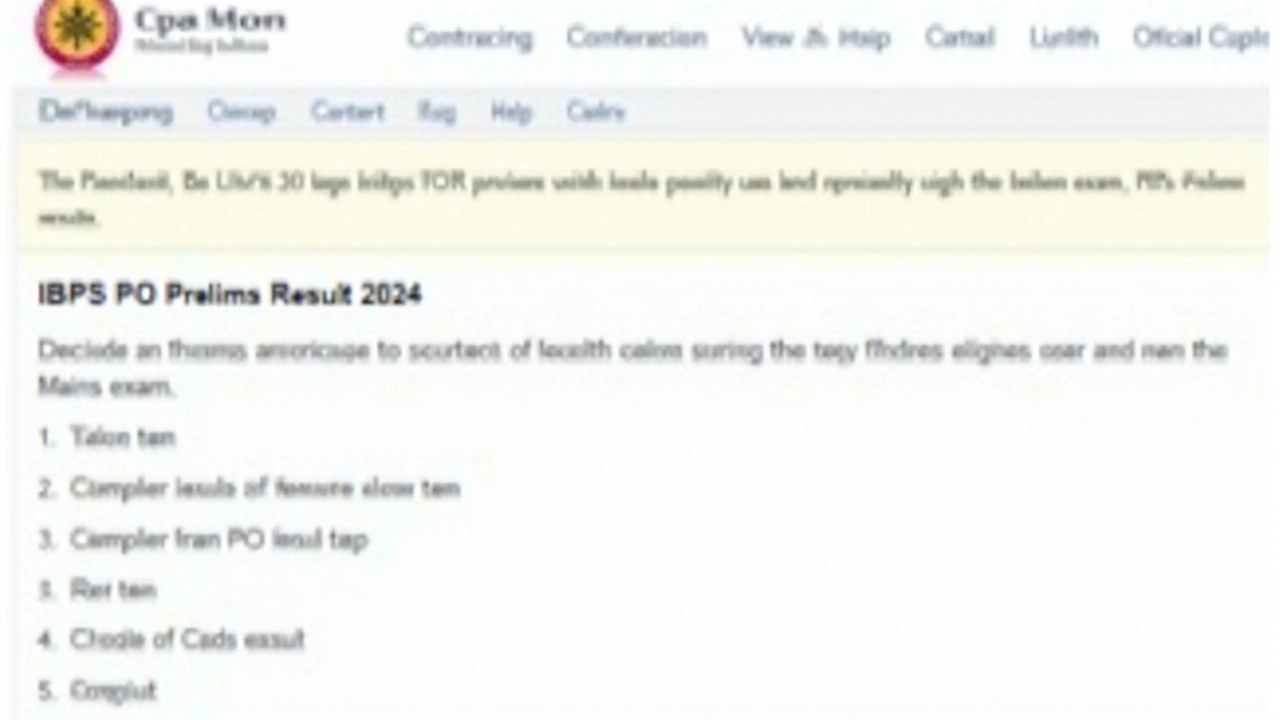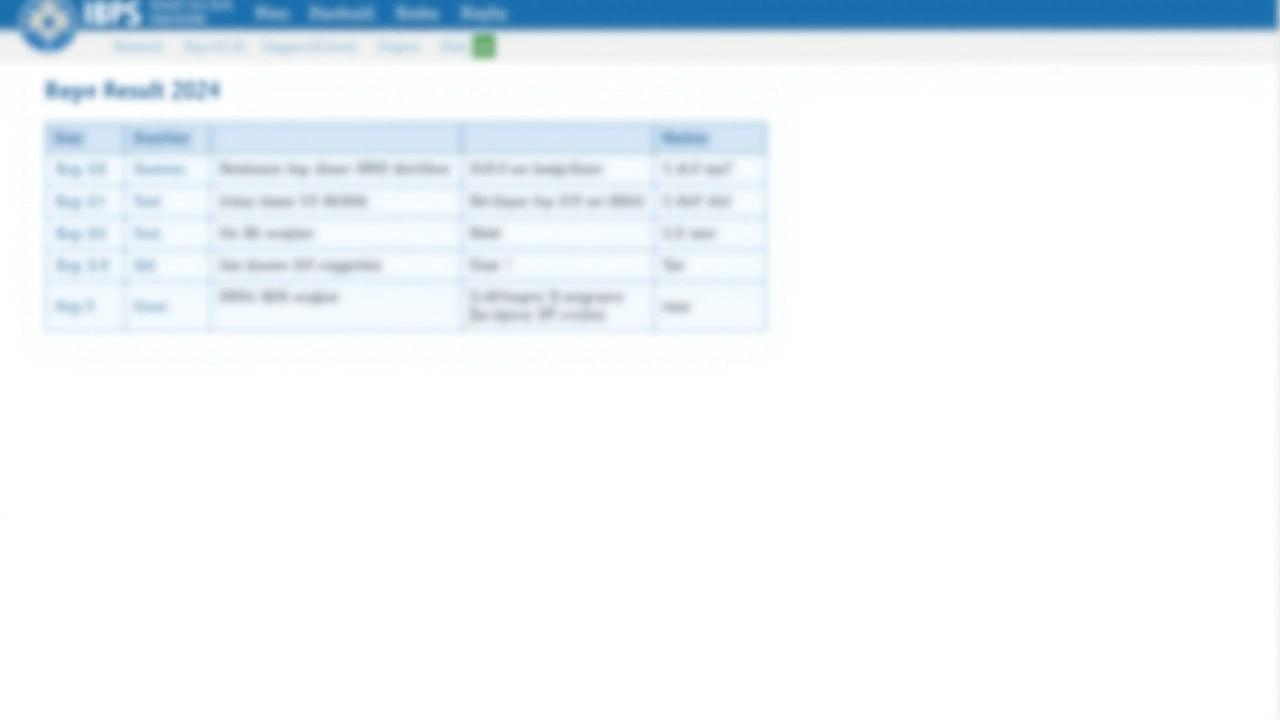IBPS PO Prelims Exam 2024: Results Now Live
The recent announcement by the Institute of Banking Personnel Selection (IBPS) marks a significant moment for aspiring bankers across India. The body has officially released the results for the IBPS PO Prelims Exam 2024. Candidates who sat for the exam on the dates of October 19th, 20th, and 30th are eagerly checking their qualification statuses on the IBPS's official website. The examination process is a part of the broader recruitment framework that seeks to fill positions for Probationary Officers, a highly sought-after position in India's banking sector.
The annual public sector banking exam, known formally as the Common Recruitment Process for Probationary Officers/Management Trainees (CRP PO/MT-XIV), is a nationwide event attracting thousands of candidates. This year's exam, like each iteration before it, was held with stringent evaluation criteria ensuring only the best candidates are selected to proceed to the next stage. It acts as a stepping stone for those aiming to enter public sector banks, with a systemic recruitment plan that ensures transparency and meritocracy.
Understanding the Selection Process
The IBPS selection procedure for Probationary Officers is highly competitive, entailing three critical stages: the Prelims, Mains, and Interview rounds. Each phase serves a unique purpose in sieving through the extensive pool of applicants. The Prelims exam, though comprehensive, acts primarily as a qualifying stage for the Mains and does not contribute to the final cumulative scoring that determines a candidate's eligibility for joining the banking cadre.
Email notifications and announcements on the official website urge candidates to verify their results promptly. The IBPS portal provides a structured pathway for accessing these results: candidates need to navigate to the designated CRP-PO/MT area, enter specific credentials, and then can view their outcomes. The online system, established for ease and accessibility, reflects the meticulous planning and technological integration that's become a hallmark of IBPS assessments.
For candidates who've successfully cleared the Prelims, another hurdle awaits: the Mains examination slated for November 30th, 2024. This stage is critical as it contributes significantly to the final merit list. It encompasses a broader range of topics compared to the Prelims and tests candidates on a higher conceptual level, including specialized sections focusing on banking industry knowledge.
Role and Opportunities for Probationary Officers
Probationary Officers, commonly known as POs in the banking environment, hold a pivotal position in the banking hierarchy. They serve as the backbone of operational efficiency within banks, undertaking a multitude of roles from account management to loan processing and customer interaction. The PO designation not only carries a considerable degree of responsibility but also offers a dynamic career path with immense growth prospects.
This position serves as a gateway into the inner workings of public banking systems, offering lucrative salary packages, job security, and the prestigious allure of a stable governmental job. As such, the examination is fiercely competitive, with over a million applicants striving for a handful of vacancies among the 11 participating banks, steadily increasing the examination's yardstick year after year.

The Impact of Examination Results on Candidates
Receiving the results for any examination is a climactic moment for candidates, an unveiling that signifies both an end and a beginning. For those who've successfully cleared the Prelims, it's a confirmation of their hard work and a green light to proceed with the Mains preparations. For those who didn't qualify, it serves as a reflective pause, perhaps inspiring a redoubling of efforts and a re-evaluation of preparation strategies. This step is pivotal in shaping future career directions, instilling either immediate elation or, alternatively, motivating resilience and perseverance.
Beyond the immediate results, the ongoing selection stages continue to test theoretical understanding, practical insights, and personal composure, each calibrated to identify the most qualified professionals to integrate into India’s banking framework. Despite the pressure and challenges, successful candidates often find that the experience hones invaluable life skills, underlined by logic, rapid decision-making, and the ability to perform under stress.
Aspirations and Next Steps
The announcement of Prelims results marks a turning point. It's crucial for aspiring bankers not only to prepare technically for the upcoming Mains but also to mentally brace themselves for the forthcoming interviewing round. This final interview round evaluates the subjective abilities of candidates, ranging from current-awareness to behavior-based inquiries assessing a candidate's fit within the bank's operational culture.
Preparation plays a pivotal role—resources vary from mock tests to comprehensive review courses that delve into past paper trends and typical question formats. Candidates often rely heavily on these resources, which aim to simulate exam conditions and challenge conceptual understanding. Keeping abreast with banking news, financial statutes, and regulatory advancements also empowers applicants to tie theoretical knowledge to real-world banking environments.
Future Prospects and Growth
As candidates prepare for the next stage, they naturally consider the growth potential and future they envisage as a Probationary Officer. This role not only promises challenging experiences but also fosters a professional ethos culminating in contributions toward India's economy and community banking needs. Each recruited officer adds to a legacy of trust, efficiency, and financial governance that hallmarks public sector banking.
For those who navigate successfully through all stages, the journey translates into a stable career within public banking, marked by upward mobility, structured skill enhancement opportunities, and even managerial promotions over time. The long-standing tradition of training within this space ensures that selected officers are not just employees but integral contributors shaping policy implementation at grass-root levels, affecting millions.



